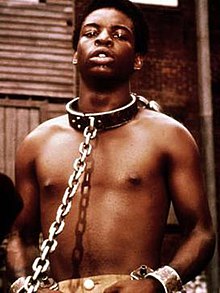 Kunta Kinte (c. 1750 – c. 1822; /ˈkuːntɑː ˈkɪnteɪ/ KOON-tah KIN-tay) is a character in the 1976 novel Roots: The Saga of an American Family by American author Alex Haley. According to Haley, Kunta Kinte was based on one of his ancestors: a Gambian man who was born in 1750, enslaved and taken to America and who died in 1822. Haley said that his account of Kunta's life in Roots is a mixture of fact and fiction, to an unknown extent.[1]
Kunta Kinte (c. 1750 – c. 1822; /ˈkuːntɑː ˈkɪnteɪ/ KOON-tah KIN-tay) is a character in the 1976 novel Roots: The Saga of an American Family by American author Alex Haley. According to Haley, Kunta Kinte was based on one of his ancestors: a Gambian man who was born in 1750, enslaved and taken to America and who died in 1822. Haley said that his account of Kunta's life in Roots is a mixture of fact and fiction, to an unknown extent.[1]Kunta Kinte's life story also figured in two US-made television series based on the book: the original 1977 TV miniseries Roots,[2] and a 2016 remake of the same name. In the original miniseries, the character was portrayed as a teenager by LeVar Burton and as an adult by John Amos. In the 2016 miniseries, he is portrayed by Malachi Kirby.[3] Burton reprised his role in the TV movie Roots: The Gift, a fictional tale originally broadcast during the 1988 Christmas season.
Biography in Roots novel
In popular culture
Kunta Kinte has inspired a reggae riddim of the same name. This started off life as a track called Beware Of Your Enemies released from Jamaicas Channel One. A dub version, put out in 1976 by Channel One house band The Revolutionaries became a sound system anthem for many years on dubplate, and inspired a UK version produced by Mad Professor in 1981. It has also inspired jungle covers.[10]
There is an annual Kunta Kinte Heritage Festival held in Maryland.[11]
NFL player Colin Kaepernick wore a tshirt with "Kunta Kinte" emblazoned on it to his controversial NFL tryout, which CNN interpreted as "Kaepernick appeared to use the reference to make a statement: He will not change who he is to appease the powers that be."[12]

Comments
Post a Comment